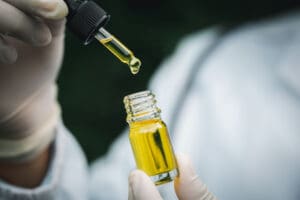Headaches and migraines can be debilitating for patients, even requiring expensive biologic therapy to treat severe cases. However, people are turning to cannabis as a medicinal option to treat and prevent their headaches. Much of the information detailed below about how cannabis works in headaches/migraines comes from an excellent review from Bryson C Lockhte et al. called “The use of Cannabis for Headache Disorders”.
What types of headaches/migraines are there?
There are several types of headaches with different symptoms and severity. Some of the more common forms of headaches are:
Tension Type headaches are the most common and are generally what most people will experience. These headaches produce symptoms of a pressure band circling around the temples, forehead and back of the head which can last hours to days. Tension-type headaches are chronic if they occur at least 15 days out of the month for more than 6 months. For patients who experience chronic headaches, they may need to take daily medication to reduce the frequency.
Cluster headaches are the most painful of the headaches. They present as excruciating pain usually on one side of the head and can also cause a blocked nose with watery eyes. This type of headache is much shorter in duration compared to other headaches, lasting between 20 minutes to 2 hours.
Migraines are generally more painful than tension type headaches but less painful compared to cluster headaches. They can cause light and smell sensitivity, throbbing pain of the head, face and neck, sinus congestion, dizziness and nausea. Some people also experience a visual aura before the onset of a migraine. These sensory disturbances range from seeing sparks and zig zags to a tingling sensation on one side of the body or an inability to speak clearly. The aura can serve as a warning of the impending migraine.
How does Cannabis treat headaches/migraines?
The endocannabinoid system (ECS) is theorized to significantly influence headaches and migraines. The ECS is a system in the body that has a large role in modulating several bodily processes, which includes the brain, spinal cord, nerves, and muscles. Cannabis interacts with the ECS via different mechanisms to treat migraines/headaches.
Possible mechanisms of action of Cannabis to treat headaches/migraines:
- There is data to suggest that people who have an endocannabinoid deficiency are more prone to headaches. Which is why cannabis is thought to act as a supplement and treat the deficiency and headache.
- Fluctuating concentrations of serotonin in the central nervous system can worsen migraines. Cannabinoids have shown to stabilize platelets and prevent them from releasing more serotonin during migraines.
- Activation of glutamate receptors in the brain is associated with the visual aura that patients can experience before a migraine. Cannabis (specifically the THC in cannabis) can stop the over-activation of the glutamate receptors and may stop the migraine from occurring.
In the current landscape of cannabis research, a lot of the data is primarily large surveys. This type of data has lots of biases and this must be considered when healthcare professionals make recommendations using this information.
The Effects of Cannabis on Headaches/Migraines
A large observational study “Short- and Long-Term Effects of Cannabis on Headache and Migraine” by Carrie Cuttler et al. looked at how cannabis impacts headaches and migraines. The group of researchers took data from “Strainprint” which is a cannabis app that allows users to track their symptoms before and after they use a particular dose/strain of cannabis. They analyzed data from 12,293 sessions where cannabis was used to treat headaches and 7,441 sessions where it was used for migraines. Several interesting findings that came from the study:
| Finding | Analysis |
| Most patients, 89.9% for headaches and 88.1% for migraines found cannabis helpful in reducing severity. | This information is likely overestimating how useful cannabis is for headaches/migraines since patients using the Strainprint app likely find cannabis helpful in some capacity. However, it does show clearly that people find cannabis helpful in treating headaches/migraines. |
| The most severe headaches were associated with the greatest reduction is symptoms. | This suggests cannabis becomes a more effective when treating the most severe headaches. |
| Cannabis concentrates (not dry flower) were found to have the largest improvement of migraine symptoms. | However only a small portion of the patients used cannabis concentrates (3.4%) in the study. There is not enough data to make this claim. |
| Cannabis strain and THC/CBD variations did not show one being more effective than the other. | It would be exceptionally difficult to detect clinically significant differences between cannabis strains in this study due to the sheer number of available strains on the market. Therefore, it is possible some strains of cannabis are more effective than others. |
| The results showed that cannabis may be more effective for men more compared to women. | This discrepancy may be due to inherent biases of the study. The difference between men and women is quite small at only 1.1%, which may not be considered clinically significant. |
| The study found no optimal dosing for headache and migraine treatment. | This indicates a personalized approach is needed for cannabis dosing and that a “one size fits all” will be ineffective. |
| The study found that patients required higher doses for subsequent cannabis treatments to manage their headaches. | This may indicate that tolerance may develop, and patients may require higher dosing to treat their headaches. Interestingly this was not found with migraines. It is unclear if tolerance does develop or if this is due to reporting biases of the study. |
Conclusion
The study provided a lot of interesting information and supports that cannabis may have a role in therapy for the treatment of headaches/migraines. However due to limitations and biases inherently built into this study, the conclusions have to be taken with a grain of salt.
It is crucial for more studies to be published with more robust study design. This will allow healthcare professionals to provide stronger recommendations regarding cannabis use in headaches/migraines.
Contact Apothecare for a consultation to find out if cannabis is right for you!


